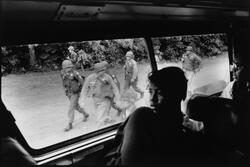Repairing a Fractured US Christianity
The stark, multidimensional divisions between us are now the most prominent feature of American national life. They usually present themselves in racial, regional, cultural, and gendered terms. Yet they are all funded by deep theological convictions as well.
Though it is easier to blame these ills on a kind of hyper-partisanship, the problem runs deeper: our traditional means of dealing with partisan conflicts in a late-modern liberal democracy have proven to be ineffective, at least for now. In other words, the commonly accepted set of ideological commitments at the heart of a liberal democracy have themselves come under attack. The January 6th insurrection at the US capitol has been consistently described in these terms.
The Christian community in America cannot address what ails the nation if it does not address the same infirmity in its own body.
The fracturing of American political life is, unfortunately, matched by a concomitant fracturing of American Christianity. These national fissures have been present from the very beginning. They have often been obscured by dominant narratives of the unlimited economic promise of capitalism and the irresistible influence of Western cultural power.
When was America Born?
However, of late, these fissures have erupted in our national discourse in highly problematic ways. The conflict around our national origins is a case in point. We cannot agree on whether the nation was born in 1619 with the arrival of African slaves or 1776 with the codification of propertied white maleness as the mark of citizenship. Because Americans disagree on when we were born, we are continually conflicted about who we are.
American identity has always been contested and fluid, yet to point out this very fact is often to be labeled “un-American.” That is, to be an American, for some, means to fit within a fixed set of parameters. In similar manner, American Christianity has been pulled into opposite camps. The labels “evangelical” and “liberal” are increasing useless in pointing to the theological essence of each because contemporary shapeshifting has politicized language itself.
Called Out By God
I want to suggest that an embrace of the concept of justice—a thoroughly biblical term—can deliver us from the maelstrom of vacant categories and toward the recovery of the genuinely human. I want to suggest that recovering the genuinely human requires unequivocal rejection of one its most significant obstacles, racism. The Christian community in America cannot address what ails the nation if it does not address the same infirmity in its own body.

As I reflect on these national challenges, questions persist which the Christian community must face if we are to be redemptive and reconciliatory agents of Christ in the world. What does it mean to be the ekklesia or those called out by God? What does it mean to embody a new oikonomia or social arrangement? What does it mean to live in communitas or that form of social life that affirms both the common and individual expressions of humanity?
Avoid Abstractions
First, justice needs to be the fulcrum of our pastoral (missional, liturgical, and evangelistic) expression of faith. Too often justice is associated with public and prophetic pronouncements—but is absent from our personal interactions. The term “social justice” has a curious way of sometimes rendering justice impersonal and abstract. The fact is that justice must be embraced as an act of pastoral care as well as prophetic witness. To paraphrase the 20th century sociologist C. Wright Mills, personal troubles are rooted in structural inequities, and systemic inequities give rise to personal problems. If we are to be the ekklesia, God’s love must find public expression as a thirst for justice. But one of the most potent contributions that progressive Christian communities can contribute to healing the great divides in our national life is to develop a practical theology of justice that does not limit justice to either the social or the personal realms. We need both.
Race is Idolatry
Second, the Christian community needs to affirm that in America race matters. There is a long historical trajectory in the life of American churches in which racism is denied, ignored, or embraced. Church luminaries from John Wesley to Jarena Lee to Martin Luther King, Jr. have stressed that a reckoning with racism is impossible for the church to evade. Racism is an idolatrous form of faith and in the final analysis demands unquestioned fealty. Racism arranges the household in a manner that distributes the resources of the household unequally. It privileges whiteness and penalizes blackness. Racism depends on a corrupt economy. African-American writers like James Baldwin, Sonia Sanchez, and Toni Morrison have pointed to the cost of being Black in America. That is not new. What is novel about this historical moment is a growing awareness among scholars that there is a price to whiteness. Discussions around “white fragility” highlight this fact. In the words of Martin Luther King, Jr., because of its economy of racism “America has given African Americans a bad check” when it comes to the rights of full citizenship. And when submitted that check has come back marked “insufficient funds.”
What is being discovered in this moment is that the value of whiteness has been propped up by a kind of “Confederate” currency. This is why many of the symbols of former slave states are cherished. The Christian community is called to embody a different economy—one which depends neither on bad checks nor worthless currencies, one which neither deflates the value of Blackness nor inflates the worth of whiteness. The Christian community must embody an economy where different gifts are valued equally.
Overcoming the Great Malady
Third, the Christian community must embrace a form of social life defined by hope, and where boundaries are not barriers to communion. The early New Testament church defined itself more by who was included rather than who was left out. Its social life was defined by its eschatological hope and its focus on the imminent return of Jesus Christ. This liminal, transitional state was the result of its conviction that it was living between the present and the future. The great malady affecting many segments of American Christianity today is a loss of hope. It is this loss of hope that leads many self-described evangelicals to embrace a cultural and political message that there is no better future awaiting the nation; that all that remains is to embrace a notion of a mythical past and to defend it to the death. The faith of the New Testament church reminds us that we are always on the way to becoming who we really are.
To lead communities struggling with these challenges is no easy task. Even more difficult is the task of preparing such leaders. As one who has spent the majority of my life reflecting on the work of ecclesial leadership and theological education, it has become clear that preparing such leaders means that the questions of today must draw on the faith of yesterday and the aspirations of tomorrow. Yale Divinity School’s mission includes shaping future leaders of church and society. Its leadership and faculty have embraced that challenge. My years as a student have prepared me to continually reflect on the character of faith-informed leadership in 2021 and beyond.
The Rt. Rev. James H. Evans, Jr. ’75 M.Div. is former president at Colgate Rochester Crozer Divinity School (1990-2000), where he is now emeritus professor of systematic theology. He received a Ph.D. from Union Theological Seminary and is the author of We Shall All Be Changed (1997), Modern Christian Thought: The Twentieth Century (2nd edition, 2006), and Playing: Christian Explorations of Daily Living (2010), all with Fortress Press.

